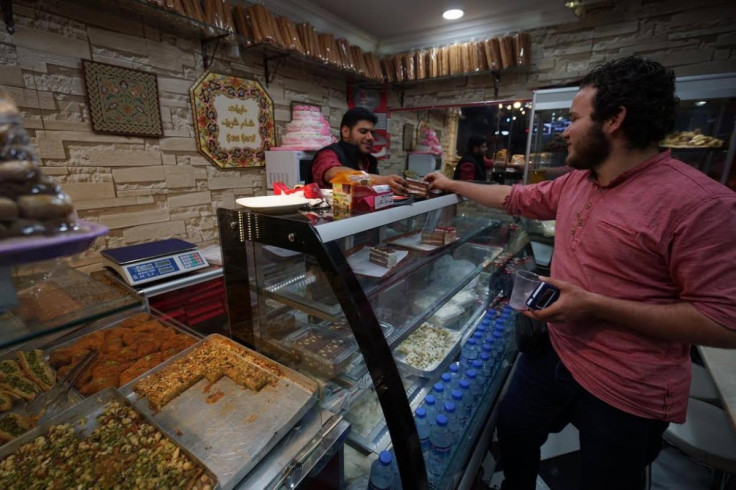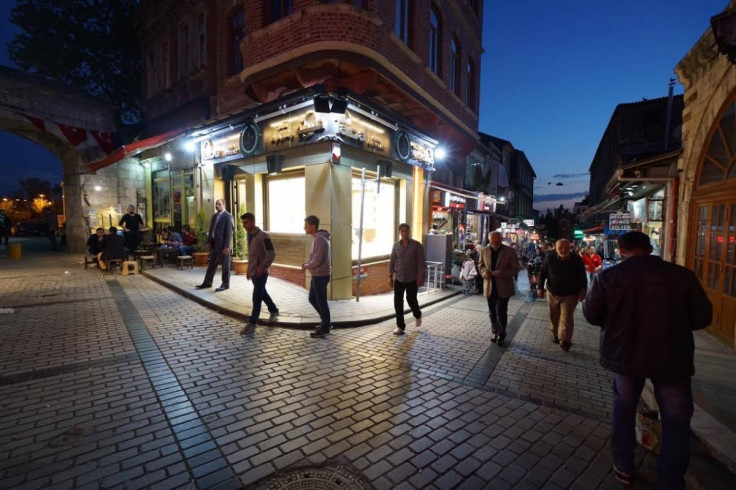Turkey's 'Little Syria' where sweets and ice-cream businesses give refugees a new start

Back in his hometown of Damascus, Ahmad Mardani created calligraphic paintings. Elegantly coloured, with delicately etched arches, flowers and letters, his work was a source of personal pride, an art and a vocation as well as a successful business.
Today, one of Mardani's favourite creations is displayed in his new business premises – a sweet shop in Istanbul. The pearly canvas reading Sam Sherif, or Holy Damascus, has pride of place in the little store, which has been running since last July. It's a valuable reminder of the stricken home Mardani – one of around 2.7 million Syrians now living in Turkey – fled several years ago.
"If I stayed and fought I'd be killing other Syrians. If I was killed it would be by another Syrian. That's too hard for me," he explained as he prepared plates of halawet el jibn for two young men. The dessert – semolina pastry topped with clotted cheese, flaked nuts and rosewater syrup – is a speciality of the cafe, a clean, fragrant treat that Ahmad's customers eat quickly on the pavement, handing back their plates when they're done.
Making sweets is a vocation Ahmad learnt in Turkey, not Syria, one of many skills he has acquired in order to survive in his new country. When he first arrived in Istanbul his first instinct was to start a business in calligraphy, just as he did at home, but his attempts fell flat. Artisanal work with Syrian roots didn't have the same market in a foreign country. Sweets, however, fitted in a little more easily. Ahmad already knew some recipes, and a few knowledgeable friends helped him with the basics while he set up the practical side of the new firm.
"The business in art didn't work out, but I didn't want to work for somebody. As a Syrian here, if you work for someone else you get exploited, working for too little pay," he explains, adding that setting up the dessert shop cost him a few thousands dollars. As well as employing fellow Syrians, he's also hired a handful of Turkish workers, including his accountant.

Ahmad is one of thousands of Syrians who have helped establish businesses in Turkey. According to the Union of Chambers and Commodity Exchanges of Turkey (TOBB), the number of new firms including Syrian partners have rocketed over recent years: from 165 in 2012, to 1257 in 2014, to 227 in the first month of this year alone. In Gazientep in the South of the country, the number of Syrian businesses comprised 17% of the total new enterprises in 2014, and altogether the 4,000 or so Syrian firms that now exist in Turkey employ thousands of Turkish and Syrian workers.
Syrian people are good at cooking, at desserts and all kinds of food, and smart when it comes to business too.
In the Fatih neighbourhood where the sweet shop is located, the impact of the influx is most keenly felt. Some 325,000 Syrians are thought to be living in Istanbul, and the high percentage in Fatih has earned it the sobriquet "little Syria". Ahmad estimates that 11 or 12 of the businesses on this cobbled, sloping street are run by Syrians. The abundance of Arabic signs, street chatter, and the smell of Syrian cuisine from many of the shops and restaurants attests to his guess.
"Syrian people are good at cooking, at desserts and all kinds of food, and smart when it comes to business too," said one business owner, at his ice-cream cafe close to Ahmed's shop. The entrepreneur – who declined to give his real name, for fear of endangering his family back in Damascus – believes Turkey is full of opportunities for Syrians. His cafe is part of a chain that operates in Syria and he says it's been easy to rent a place, open a business, and integrate with his Turkish neighbours in Istanbul. "It's competition, just like between other businesses," he explained. "We have a relationship. There's no problems – we say good morning to each other when we open the shop every day."

The profitability of some businesses, however, doesn't mean that Turkey's entire Syrian community shares in this success. In the streets outside the warm lights and tempting offerings of Syrian-owned stores, two young teenage girls in coats and boots are selling bottles of water, latching in apparent desperation onto passers-by that show any interest. Both speak fluent Turkish, but they've learned the language from the streets, not through formal education. For those that don't have the capital or capacity to set up businesses – the majority, unsurprisingly, in a refugee community – work is generally under-the-radar and exploitative, with scant protection and low pay.
"One doesn't want to paint too rosy a picture. At least half of the kids are still out of school," Omer Karasapan, a coordinator at the World Bank, told IBTimes UK. "I think that many of the people who do start businesses come from families of entrepreneurs – to be successful in private businesses under the government that they've had is not easy – and already had a successful business in Syria."
I want to stop this bad stereotype of Syrians, to show that Syrians are helping each other.
Still, those that are setting up firms hope to create an environment that might make it possible for others to do the same. For the businesspeople IBTimes UK spoke to, employing fellow Syrians was a moral imperative.
"It's a priority for me that Syrians work in my store, because they're from my city," the ice-cream shop owner said. "If I don't help them, who will? I want to stop this bad stereotype of Syrians, to show that Syrians are helping each other."
Both entrepreneurs see their businesses as critical to life in Turkey. Unlike many other Syrian refugees living in the country, or elsewhere in Lebanon or Jordan, neither have any interest in heading for Europe. Stability and success, and a project to call their own, has kept them going despite the turmoil back home.
"It's much more difficult for people to get angry at someone who's paying taxes, employing people themselves," Karasapan said. "We can see that when refugees are able to start their own firms like this, that's when they become more integrated."
© Copyright IBTimes 2025. All rights reserved.






















